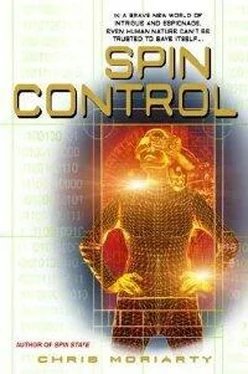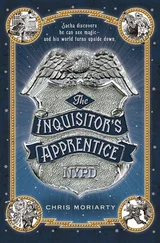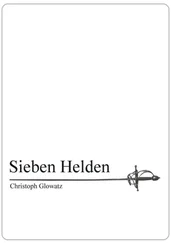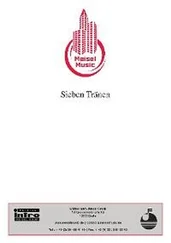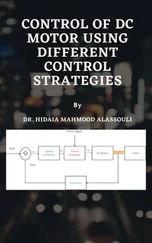Ahmed was the first to the door when they made planetfall. He stepped up to the porthole and peered through the viruglass, gauzy white with decades of impact scratches—and caught his breath sharply enough to send a stab of fear coursing through Arkady’s body.
“What is it?” someone asked.
“Come see.”
The team bunched together in the airlock, staring up at the distant sky like miners peering out of the depths of a pit shaft. The Ahmeds had set the lander down in a broad open area that Arkady would have called a pasture had Novalis possessed any grazing animals, or any mammals at all for that matter. There was a river not far off, and it might have been visible from the landing site during what passed as winter on Novalis. At the moment, however, the line of sight extended for about sixty meters downhill and ended abruptly in a tangled, spiky, completely solid wall of greenery.
Arkady and the rest of the survey team stood in staring amazement. These were not the straggling scrub oak and cottonwoods of the Periphery’s terraformed planets, including Gilead. The trees—if you could call such giants trees—towered overhead for fifteen, twenty, forty meters. Even on a first, casual inspection Arkady counted some two dozen different species. He couldn’t begin to imagine the intricate network of interlocking water, air, and chlorophyll cycles it must take to maintain this world-girdling symphony of greenery.
Shy Bella was the first one to get her breath back and summon up words when they saw what was waiting for them outside the airlock.
“What is that?” she whispered.
Arkady craned his neck backwards, feeling like he was looking up out of a well, his ears full of a roaring like the sound of waves beating on a rocky shore.
“I think it’s a forest.”
THE ALMOST INFINITE DISTANCE BETWEEN A CAUSE AND ITS EFFECT
In war, more than any other subject, we must begin by looking at the nature of the whole…and…the vast, almost infinite distance there can be between a cause and its effect.
—CLAUSEWITZ (1780–1831)
The real problem with chess, in Cohen’s opinion, was that the options for any given world state were so limited. What fun was it, after all, to intuit your way through a game that you could beat into submission by brute processing power?
Not that chess lacked historical and aesthetic interest. In fact, he was currently running a simulation of the Deep Blue-Kasparov match—worthwhile if only for the opportunity to admire the angels-on-pinheads acrobatics of the old-time code jockeys. But Cohen had been built with a bigger game in mind.
Life, if you wanted to call it that.
And every ant algorithm and Kohonen net in his far-flung systems was telling him that this moment—here under the tall sky of Earth, sitting in an outdoor café on the treacherous edge of the International Zone, waiting for a man who was going on forty-two minutes late by Cohen’s favorite, albeit hopelessly inaccurate, wristwatch—was one of life’s dangerous moves.
They’d waited while dawn burnished the Dome of the Rock and pressed her ice-age-cold fingers into the crooked squares and narrow alleys of the Old City. By the time the first real sun of the morning set the dust motes dancing over their table, early-rising Hasidim were returning from the Wailing Wall and the automated muezzin was wafting the call to prayer through the Temple Mount’s loudspeakers, reminding the faithful that there was no god but God and prayer was sweeter than sleep.
The streets swelled with a rising tide of early-morning commuters. Metal shutters rattled up on shop fronts. Shopkeepers called to each other in the archaic, Arabic-inflected Hebrew of the Jerusalemites.
“It’s so quiet,” Li said.
Cohen didn’t have to ask what she meant. To posthuman ears, the morning cacophony was overwhelmed by the absolute silence where all the accompanying streamspace chatter of a busy commercial street should have been.
Cohen threw out a hand to encompass the whole crooked, claustrophobic tumble of the Old City. “Behold the Great Unwired, brought to you by a multigenerational coalition of SUV-driving Americans and self-serving orbital corporations and a UN General Assembly whose environmental watchword is not-in-my-backyard!”
The technological embargo had been imposed in the late twenty-first century, when Earth was in ecological free fall and the rats were just starting to realize that they didn’t have another ship to jump to. By then the only people left on the planet were the Exempt Populations—aboriginals and major world religions—and the rogue nations. The aboriginals hadn’t caused the problem and thus, in a brilliant display of what router/decomposer liked to call human illogic, weren’t given a say in solving it. The fundamentalists just wanted to kill each other in peace without tripping over any stray Peacekeepers. And the rogue nations (a polite way of saying America) had parted ways so decisively with the UN by then that no one even bothered to ask if they wanted to participate.
America resisted, of course. But economies can’t survive indefinite solitary confinement any more than people can. Doing business with America soon became bad business as well as bad politics. The American juggernaut sputtered to a slow crawl, crippled by climate change, economic isolation, and a massive multigenerational brain drain that was gleefully encouraged by Ring-side immigration policy.
Meanwhile the technological gap between Earth and the Ring got wider with every new advance in AI design or microgravity manufacturing. The generation ships lifted off from every overpopulated and impoverished corner of the globe. And the Embargo, ostensibly a simple moratorium on sale of space-based technology to Earth, began to achieve its true purpose: the reduction of Earth’s human biomass to a level that the crippled planet could sustain.
It worked. Suburbs were swallowed up by weedlot wilderness. Trees and plants—albeit only self-pollinating ones—replaced concrete. Frogs were gone. So were butterflies, non-genetically-modified honeybees, most large mammals, and the migratory songbirds whose flocks had blackened Earth’s skies in a time beyond the reach of even Cohen’s earliest stored memories. But their ecological niches had been filled in, more or less, by other species. The world might not be as complex or as beautiful as it had been before man’s Industrial Age, but it worked. In fact, it worked well enough that people were even starting to talk about loosening the Embargo.
People on Earth, that is.
No one Ring-side wanted to hear a word about it.
The humans who imposed the Embargo had meant it to be temporary. Industrial activity would be shut down until the planet’s biogeological functions righted themselves. And when the environmental remediation was complete, everyone would move back downstairs and get back to life as normal. After all, Earth was home.
But Earth wasn’t home to the 18 billion humans and posthumans who now inhabited the Orbital Ring. To them, Earth was just another moon. But a moon with a difference: a moon that had something they desperately needed.
Water.
Earth was dry and getting drier. The Ring was thirsty and getting thirstier. And every human who wasn’t born on Earth meant a few hundred thousand extra liters of drinkable water for the Orbital Ring. So the UN offered Earth’s few remaining humans a Solomonic choice, wrapped in the neutral language of the Tech Embargo: stay on Earth and accept the overwhelming odds against ever producing live offspring, or emigrate to the Ring and enjoy all the benefits of modern genetic engineering. And in the poisoned Holy Land, where one could go days on end without seeing a single child, that choice was as stark as the choice between life and death.
Читать дальше
